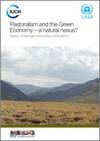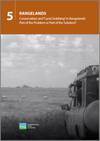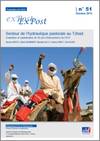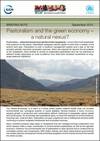This video shows some of the main challenges of the Raikas, a semi nomadic community in Rajasthan, India and how ICARDA responds to them. Change of land use, climate change and little social recognition for mobile livelihoods make it harder for the Raikas to find water and pasture.
Year of publication: 2014Organization: Individual authors
Topic: Climate change, Economy, Land
Language: English
Type of document: Videos
Geographical coverage: South Asia
This study focuses on pastoralism’s current and future potential for securing sustainable management and green economy outcomes from the world’s rangelands. It synthesises existing evidence and uses practical examples from mobile pastoralism in Europe, Latin America, North America, Central, Western and Southern Asia, Australia and throughout Africa to both demonstrate the system’s inherent characteristics for adaptive sustainability and some of the key opportunities and challenges for promoting development in rangelands. Finally, the study identifies the key enabling conditions required for pastoralism to deliver on its potential role in a Green Economy.
Year of publication: 2014Organization: International Union for Conservation of Nature (IUCN), United Nations Environment Programme (UNEP)
Topic: Economy, Environmental services
Language: English, Français, Español
Type of document: Technical
Geographical coverage: Global
Large-scale land acquisitions have increased in scale and pace. The areas most affected are the global “commons” – lands that local people traditionally use collectively — including much of the world’s forests, wetlands, and rangelands. In some cases land acquisition occurs with environmental objectives in sight – including the setting aside of land as protected areas for biodiversity conservation. There is a potential opportunity here for greater collaboration between conservation interests, and local communities’ land rights interests with their supporters amongst human rights and social justice movements. This issue paper documents experiences from the rangelands of Mongolia, Kenya, India, Ethiopia, and other countries.
Year of publication: 2014Organization: International Land Coalition (ILC)
Topic: Land
Language: English
Type of document: Technical
Geographical coverage: Global
This study explores the nature of ecosystem services provided by livestock species and breeds, with special consideration to the important contributions to these by small-scale livestock keepers and pastoralists. Livestock species and breeds are key components of agro-ecosystems. They provide provisioning services (such as the supply of food, fibres and skins), supporting and regulating services (such as waste recycling or weed control) and cultural services (such as cultural heritage and identity). The study describes the most serious constraints and opportunities to the provision of ecosystem services. It identifies international instruments and bodies that support and can further promote the actual and potential roles of livestock species and breeds, as well as their keepers in the provision of ecosystem services.
Year of publication: 2014Organization: Food and Agriculture Organization of the United Nations (FAO)
Topic: Environmental services
Language: English
Type of document: Technical, Scientific
Geographical coverage: Global
Pastoral mobility must be preserved to ensure Mongolian rangeland sustainability. Pastoralism in Mongolia is currently going through major transformations (pasture user groups, cooperatives, draft Land Law, climate change, conflicting forms of land use i.e. mining, cropping, national reserves). In this new context, the value of mobility might not be fully appreciated in new policy formulations, which could weaken Mongolian pastoral systems. Supporting mobility requires an adequate institutional framework in the provision of services (e.g. water, veterinary, education and health) and institutional flexibility with stronger and reciprocal intersoum inter-aymag agreements for hosting neighboring herders during climate shocks.
Year of publication: 2014Organization: University of Oxford
Topic: Organization
Language: English
Type of document: Policies and legislation
Geographical coverage: Central Asia
This brief lists a range of policies to support pastoralists to market their products.
Year of publication: 2014Organization: International Institute of Rural Reconstruction (IIRR)
Topic: Economy
Language: English
Type of document: Technical, Policies and legislation
Geographical coverage: Eastern Africa
This evaluation has three objectives: i) evaluate the overall relevance and coherence of AFD Group interventions; ii) assess the performance of pastoral water projects; iii) propose strategies for continuing the process (with significant changes) or gradually winding it down. This exercise covered 11 projects implemented in three areas of Chad between 1993 and 2013.
Year of publication: 2014Organization: French Development Agency (AFD)
Topic: Land
Language: English, Français
Type of document: Technical
Geographical coverage: Central Africa
Pastoralism lies at the nexus of the three pillars of sustainability and provides a combination of social, environmental and economic benefits. It exploits vast areas of land that may be best suited to multi-purpose use: extensive production of high quality food products combined with delivery of high value ecosystem services. Policies, public services and investments have to be tailored to support this combination of uses and to ensure that the full range of benefits are adequately compensated and protected.
Year of publication: 2014Organization: International Union for Conservation of Nature (IUCN), United Nations Environment Programme (UNEP)
Topic: Economy, Environmental services
Language: العربية, 漢語, English, Français, Русский, Español
Type of document: Technical
Geographical coverage: Global









